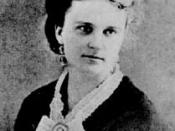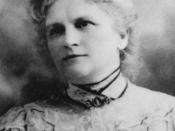American society of the late 1800s was centralized around a common belief that the white race was the only pure race, which should therefore be the superior race. It was not a man's character that defined his held him above others, but it was the white of their skin, the cost of the estate, and significantly the esteem of their name. Kate Chopin makes a social comment on these twisted values in the short story, "DÃÂésirÃÂée's Baby."� She develops the character of Armand Aubigny to allude to the racist world around her and the subordination of African-Americans during that time period. Through him, she also portrays the incorrigible human nature that incites one to find a scapegoat for one's own problems and its pernicious consequences. Armand, a complex, flawed character, is created by the author to expose the unethical values that plague society and shed light upon their lamentable effects.
Armand's greatest flaw is his racist beliefs. To portray the adverse effects of his hate, he is subject to the worst punishment for his faults. To him, the Negro race is impure, inferior, and has no right to hold his proud family name. When he first falls in love with DÃÂésirÃÂée he is completely taken aback, his affection able to conquer any problems they encounter: He does not care about her "obscure origin"� (329) or the fact that she does not have a name. "What did it matter about a name when he could give her the oldest and proudest in Louisiana?"�(329). "The passion that awoke in him that day, when he saw her at the gate, swept along like an avalanche, or like a prairie fire, or like anything that drives headlong over all obstacles"�(329). His love for her reigns more important than any other impediment that blocks their...


